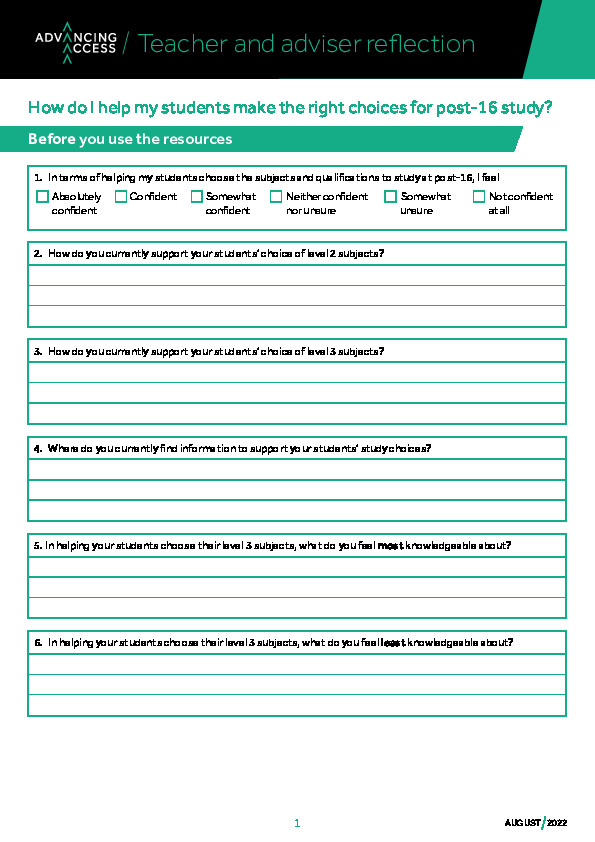Teacher and adviser reflection - helping students make the right choices for post-16 study
Content type
Teacher and adviser reflection sheets
Audience
Resource for teachers and their learners
Description
This activity has been designed to support the professional development of teachers and advisers. It should form a part of peer-to-peer training and be used alongside the guidebook, information sheets and presentation provided as a part of strand four.
This reflection sheet should be used before and after a CPD session. It enables teachers and advisers to reflect on current practice and what they have learned about supporting students to make the right choices for post-16 study.
Weblinks:
Bright Knowledge is a guide to careers, education and student life. Bright Knowledge aims to help students work out what they want to achieve and how they can get there.
‘Core maths’ refers to a group of mathematics qualifications available in England.
Russell Group universities value mathematics skills for many different degree courses and most have GCSE or equivalent requirements. Mathematical and statistical problem-solving, data-analysis and interpretation skills are useful for a wide variety of undergraduate degrees. A core maths qualification may help your students improve and maintain these skills, especially if they are not taking AS- or A-level mathematics or further mathematics.
STEM Learning provides a range of free resources to support teachers with students undertaking a Core Maths qualification.
Informed Choices is an interactive website produced by the Russell Group. Whether students know what they want to do in future or not, the website can help students to think about their A level subject choices.
The LMI Careerometer enables your students to explore different professions. They can see how much workers in different occupations typically earn and also learn more about future labour market demand for different jobs.
The Government's National Careers Service provides a wealth of free information about different careers. If a student of yours has a particular career in mind, they can use the website to find out exactly which qualifications they are likely to need.
Prospects offers useful information on career pathways, including job profiles detailing typical salaries and the qualifications and skills required by role type. There is a section on careers relevant to different degrees and a career planner and quiz.
New T level qualifications combine classroom learning with on the job experience. They can enable students to progress into the workplace or to pursue further or higher education. More details about T levels can be found on the Government's T levels website.
This useful TheUniGuide webpage provides tools, advice and guidance for students considering their study options.
TheWayUp! is an innovative game that helps students make better, more informed choices about their future.
Guidebook
| How do I help my students make the right choices for post-16 study? |
Information sheets
| Which qualifications will enable your students to progress to Russell Group universities? | ||
| Key stage 4 and 5 choices - myth-busting |
Presentations
| Presentation slides - helping your students make the right study choices | ||
| Presentation notes - helping your students make the right study choices |
Activity sheets
| Researching post-16 study options - activity for students |
Teacher and adviser reflection sheets
| Teacher and adviser reflection - helping students make the right choices for post-16 study |
Webinars
| Post-16 qualifications and access to university (October 2021) |
Video case studies
Weblinks:
Bright Knowledge is a guide to careers, education and student life. Bright Knowledge aims to help students work out what they want to achieve and how they can get there.
‘Core maths’ refers to a group of mathematics qualifications available in England.
Russell Group universities value mathematics skills for many different degree courses and most have GCSE or equivalent requirements. Mathematical and statistical problem-solving, data-analysis and interpretation skills are useful for a wide variety of undergraduate degrees. A core maths qualification may help your students improve and maintain these skills, especially if they are not taking AS- or A-level mathematics or further mathematics.
STEM Learning provides a range of free resources to support teachers with students undertaking a Core Maths qualification.
Informed Choices is an interactive website produced by the Russell Group. Whether students know what they want to do in future or not, the website can help students to think about their A level subject choices.
The LMI Careerometer enables your students to explore different professions. They can see how much workers in different occupations typically earn and also learn more about future labour market demand for different jobs.
The Government's National Careers Service provides a wealth of free information about different careers. If a student of yours has a particular career in mind, they can use the website to find out exactly which qualifications they are likely to need.
Prospects offers useful information on career pathways, including job profiles detailing typical salaries and the qualifications and skills required by role type. There is a section on careers relevant to different degrees and a career planner and quiz.
New T level qualifications combine classroom learning with on the job experience. They can enable students to progress into the workplace or to pursue further or higher education. More details about T levels can be found on the Government's T levels website.
This useful TheUniGuide webpage provides tools, advice and guidance for students considering their study options.
TheWayUp! is an innovative game that helps students make better, more informed choices about their future.




